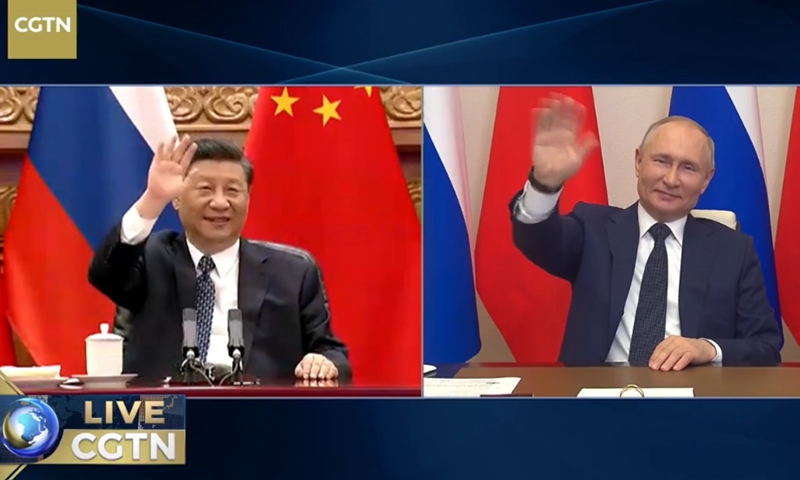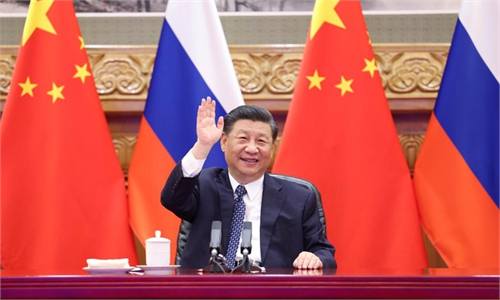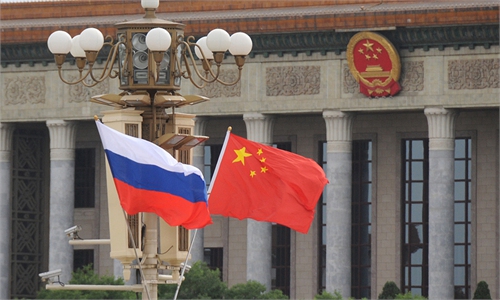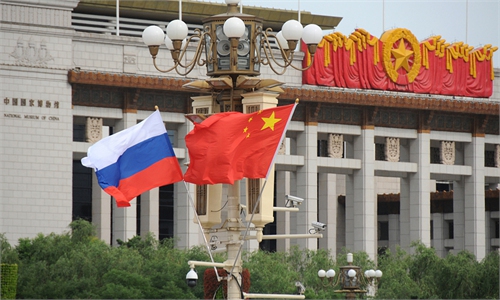
Chinese President Xi Jinping and Russian President Vladimir Putin Photo: CGTN
Chinese President Xi Jinping held a video meeting with Russian President Vladimir Putin on Monday. They issued a joint statement and announced to extend the China-Russia Treaty of Good-Neighborliness and Friendly Cooperation. Article 9 of the treaty, which was signed in July 2001, says "When a situation arises in which one of the contracting parties deems that… it is confronted with the threat of aggression, the contracting parties shall immediately hold contacts and consultations in order to eliminate such threats."Western media outlets often describe China-Russia relations as a "quasi-alliance." But neither China nor Russia has ever officially accepted such a description. They define their ties as partnership, rather than alliance. They both reiterate that their relations are at the best in history and are a model for intergovernmental relations in the 21th century.
The joint statement issued by the two heads of state on Monday included a handful of new content. It says that Russia needs a prosperous and stable China; China needs a strong and successful Russia; and the two countries see each other as a prioritized partner, and they will further deepen collaboration and cooperation in fields of politics, security, military, economic and trade.
The joint statement expressed a common stance on arms control and mentioned many related issues, such as criticizing the US withdrawing from a series of related key international treaties and deploying anti-missile systems in the world. The statement also advocates countries to pledge not to be the first to deploy weapons in outer space.
Both countries agreed to uphold common values of humanity, including peace, development, fairness, justice, democracy, and freedom. This was the first time for the two heads of state to jointly define common values of all humanity. The two sides have also expressed their opposition to interference in other countries' domestic affairs under the banner of so-called democracy and human rights, and to unilateral sanctions.
For a certain period of time, some political and media elites in Washington have been very interested in driving a wedge between China and Russia. However, what they have hyped has reflected their surprisingly low-level vision as they completely cannot understand the strategic support behind the increasingly strong China-Russia ties.
The joint statement issued on Monday noted the two countries' core diplomatic ideas. For example, a community with shared future for mankind, and the collaboration between the China-initiated Belt and Road Initiative and the Eurasian Economic Union were mentioned. Meanwhile, both countries oppose the moves to stigmatize and politicize others taking advantage of the COVID-19 pandemic and the investigations into virus origins. Besides, China expressed its firm support to Russia's resolute measures to maintain its development and stability in the long term.
It is not only an illusion but also a chimera of Washington that it can sow discord between Beijing and Moscow to facilitate its campaign to suppress the latter two separately. The comprehensive strategic partnership of coordination for a new era between China and Russia is not a temporary one aiming to withstand pressure. Instead, it has incorporated the true ideals of the two countries for the major power relationship in the 21st century, aligning their long-term fundamental interests. Such a partnership has also unleashed the abundant geopolitical advantages and potentials of the fact that China and Russia are each other's largest neighboring country. Therefore, this partnership is unbreakable.
In other words, those forces that want to destroy China-Russia relations are too insignificant to take China-Russia ties as their target.
Western media is fond of discussing which side is dominant in the China-Russia relationship and which side is more in need. The reason is simple: The alliance of the US and other Western countries is dominated by Washington, and the alliance is essentially at the service of the US' hegemonic strategy - the US gives allies some sweetness such as "providing protection" as little reward. By contrast, China and Russia are equal in their comprehensive strategic partnership. The highly coordinated needs to maintain such equal cooperation and safeguard the two countries' respective profound interests are beyond understandable for Westerners who hold tight onto their own values.
For example, neither China nor Russia will tell the other side how to deal with relations with the US or any other third country, not now and not ever. But the US will impose its will on its allies in terms of ways to handle relations with China and Russia, which will even cause conflicts. China and Russia are not only as coordinated as the US and its allies on major global issues, but also more able to coordinate their positions in many cases.
The world is more secure in peace and stability because of China and Russia's comprehensive strategic partnership of coordination for a new era. Now hegemony is counterbalanced, while fairness and justice have strong support. China-Russia relations have never been used to create geopolitical turmoil. The two countries have never threatened third parties. It is really no exaggeration to say that China-Russia relations are a model of international relations in the 21st century.



